IMDb रेटिंग
7.6/10
5.6 हज़ार
आपकी रेटिंग
जब एक बूढ़े कार्यकर्ता को गिरफ्तार किया जाता है, तो अभियुक्तों, वकीलों और न्यायाधीश के जीवन में न्यायिक व्यवस्था को रेखांकित करने वाले कट्टरता को प्रकट करने के लिए हस्तक्षेप होता है.जब एक बूढ़े कार्यकर्ता को गिरफ्तार किया जाता है, तो अभियुक्तों, वकीलों और न्यायाधीश के जीवन में न्यायिक व्यवस्था को रेखांकित करने वाले कट्टरता को प्रकट करने के लिए हस्तक्षेप होता है.जब एक बूढ़े कार्यकर्ता को गिरफ्तार किया जाता है, तो अभियुक्तों, वकीलों और न्यायाधीश के जीवन में न्यायिक व्यवस्था को रेखांकित करने वाले कट्टरता को प्रकट करने के लिए हस्तक्षेप होता है.
- पुरस्कार
- 21 जीत और कुल 10 नामांकन
Sukhdas Suryawanshi
- Sukhdev (court staff)
- (as Sukhdas Suryawamshi)
फ़ीचर्ड समीक्षाएं
Chaitanya Tamhane's Court approaches many fascinating and bitingly topical subjects for a constantly changing India. When those to the west think of India, we often imagine the hustle and bustle depicted in Slumdog Millionaire coupled with the energy and glittery elegance of Bollywood movies. Court is a slower burn with incredible wide cinematography that captures a disquieting stillness. It's almost like a political thriller where no-one can be trusted, but it's not a film that relies on tension or conclusions. It studies the westernisation of Indian culture through its network of characters, darting between the folk singer Sharmila Pawar and his 'Americanised' defence lawyer Vinay Voya, but without peeling back their layers. It's not interested in the characters as people but what they represent in the situation, wherein Pawar is being tried for inciting a man to suicide through his songs.
Instead, it contrasts the old with the new, with Indian traditions and the updates of the youths, aesthetically and with their behaviour. The courtroom drama prods at this aspect with old laws being questioned for being outdated and how they should be reconsidered. It seems a lack of compromise is also part of tradition and is something that contemporary Indians wants to implement. The film also studies the effect of art, questioning whether folk music can really change a government and if it does influence bad things incidentally, can it be held accountable? The power of poetry is a strange thing in a world drenched in culture. What counts as a performance when art is so fluid? Where do we draw the line between coincidence and crime? Court is a very dry but very thought-provoking and highly intelligent film that raises important questions about the world we live in, albeit it could've been improved by a bit more character work and a concise ending.
8/10
Read more @ The Awards Circuit (http://www.awardscircuit.com/)
Instead, it contrasts the old with the new, with Indian traditions and the updates of the youths, aesthetically and with their behaviour. The courtroom drama prods at this aspect with old laws being questioned for being outdated and how they should be reconsidered. It seems a lack of compromise is also part of tradition and is something that contemporary Indians wants to implement. The film also studies the effect of art, questioning whether folk music can really change a government and if it does influence bad things incidentally, can it be held accountable? The power of poetry is a strange thing in a world drenched in culture. What counts as a performance when art is so fluid? Where do we draw the line between coincidence and crime? Court is a very dry but very thought-provoking and highly intelligent film that raises important questions about the world we live in, albeit it could've been improved by a bit more character work and a concise ending.
8/10
Read more @ The Awards Circuit (http://www.awardscircuit.com/)
Chaitanya Tamhane's directorial debut, Court, is a multilingual, award- winning film on the "quiet violence" of the judicial system and how the State uses it to suppress political activists. Financed by the Hubert- Bals Fund and private equity, it opened to rave reviews and won Best Director and Best Film in the International Competition section of the 16th Mumbai Film Festival. It also premiered at the Venice Film Festival earlier in the year, where it won the Lion of the Future Award for the best first feature. Court successfully invokes the mood of a trial based on patently ridiculous charges, conducted with no intent other than disciplining and harassment of an activist. A phenomenon that is all too common in India. The theme is very timely given the increasingly intolerant nature of the Indian State and the large number of political prisoners languishing in jail all across the country.
The film follows the trial of Narayan Kamble (Vira Sathidar), a Dalit political activist and lokshahir (people's poet) who is arrested on stage during a performance in Bombay on charges of "abetment of suicide." The police claim that Kamble has penned and performed "incendiary" lyrics calling on Dalits to "drown themselves in sewage" provoking a municipal sanitation worker to actually take his own life by drowning in the very sewer it is his duty to clean. The absurdity of the charge is matched by the (mock?) seriousness with which it is pursued but the police and the officials of the Sessions court. While the politics of false charges and suppression of activists via legal means is an important theme in the film, Tamhane also uses the context of the trial to explore the everyday lives of the principal actors in the courtroom; especially the lawyers for defense (producer Vivek Gomber) and prosecution (played by Geetanjali Kulkarni), and the judge (Pradeep Joshi). What emerges is how extraordinary injustice is embedded in quotidian affairs. The prosecution lawyer argues against bail, ensures that an honest man of advanced years rots in police custody for no reason at all and then goes home to cook dinner and watch TV with her family.
The ponderous legal system is certainly the main protagonist, as is evident in the name of the film. And as a useful counterpoint to the brilliant and satirical Mohan Joshi Hazir Ho, Court forces us confront the fact that the byzantine alleyways of justice and the proverbial tarikh pe tarikh, are not merely the unintended result of an uncaring and bureaucratic system but rather used deliberately by the State to remove its more inconvenient citizens for some time, say three or four years. At which time it is the headache of the next set of rulers.
See the full review at: http://sanhati.com/excerpted/11761/
The film follows the trial of Narayan Kamble (Vira Sathidar), a Dalit political activist and lokshahir (people's poet) who is arrested on stage during a performance in Bombay on charges of "abetment of suicide." The police claim that Kamble has penned and performed "incendiary" lyrics calling on Dalits to "drown themselves in sewage" provoking a municipal sanitation worker to actually take his own life by drowning in the very sewer it is his duty to clean. The absurdity of the charge is matched by the (mock?) seriousness with which it is pursued but the police and the officials of the Sessions court. While the politics of false charges and suppression of activists via legal means is an important theme in the film, Tamhane also uses the context of the trial to explore the everyday lives of the principal actors in the courtroom; especially the lawyers for defense (producer Vivek Gomber) and prosecution (played by Geetanjali Kulkarni), and the judge (Pradeep Joshi). What emerges is how extraordinary injustice is embedded in quotidian affairs. The prosecution lawyer argues against bail, ensures that an honest man of advanced years rots in police custody for no reason at all and then goes home to cook dinner and watch TV with her family.
The ponderous legal system is certainly the main protagonist, as is evident in the name of the film. And as a useful counterpoint to the brilliant and satirical Mohan Joshi Hazir Ho, Court forces us confront the fact that the byzantine alleyways of justice and the proverbial tarikh pe tarikh, are not merely the unintended result of an uncaring and bureaucratic system but rather used deliberately by the State to remove its more inconvenient citizens for some time, say three or four years. At which time it is the headache of the next set of rulers.
See the full review at: http://sanhati.com/excerpted/11761/
I loved this film for it's simple and real depiction of Indian courts.
This is as close as it can get in depicting how the Indian judicial courts deal cases. Please note that this film is not exactly about a particular case, but it was more so a comment on how the judicial system works in India. Although, a case was taken to represent the judicial procedures, I looked at this film as a showcase of the process in itself.
There is a lot of reflection of reality which is a rarity in Indian films. We have camouflaged films or those which in the name of depicting reality show us the perspective of makers. The best realistic film was "Black Friday" as per me and this comes the second best. Second only because it did not have an engaging storyline or one that we would be keen to know, All it has, is a case at best about a man who is accused of raging emotions.
This is a Marathi film and I commend the fact that Marathi films have come a long way. They have made films like "Shwaas" "Deool" and many others which are like the reflection of the possibility of Indian cinema. Sadly, very few films have explored Indian emotions, Indian mindset and told Indian stories with utmost honesty.
I applaud the director Chaitanya Tamhane for not putting in any drama and also from refraining from any commercial elements and showing things as they are.
Performances are true to the characters by each one. From a sweeper to a lawyer and judge, everyone played their role as they would live it if it was their own life. The camera was used as a tool to capture the happenings instead of making anyone conscious of its presence.
I am going with 4/5. Loved it but I doubt if I would sit through this another time.
This is as close as it can get in depicting how the Indian judicial courts deal cases. Please note that this film is not exactly about a particular case, but it was more so a comment on how the judicial system works in India. Although, a case was taken to represent the judicial procedures, I looked at this film as a showcase of the process in itself.
There is a lot of reflection of reality which is a rarity in Indian films. We have camouflaged films or those which in the name of depicting reality show us the perspective of makers. The best realistic film was "Black Friday" as per me and this comes the second best. Second only because it did not have an engaging storyline or one that we would be keen to know, All it has, is a case at best about a man who is accused of raging emotions.
This is a Marathi film and I commend the fact that Marathi films have come a long way. They have made films like "Shwaas" "Deool" and many others which are like the reflection of the possibility of Indian cinema. Sadly, very few films have explored Indian emotions, Indian mindset and told Indian stories with utmost honesty.
I applaud the director Chaitanya Tamhane for not putting in any drama and also from refraining from any commercial elements and showing things as they are.
Performances are true to the characters by each one. From a sweeper to a lawyer and judge, everyone played their role as they would live it if it was their own life. The camera was used as a tool to capture the happenings instead of making anyone conscious of its presence.
I am going with 4/5. Loved it but I doubt if I would sit through this another time.
Watching Court is a unique experience. Its lazy elegance and life like sets. Definitely not for masses.
RATED 8/10
Language: Marathi
Source: Netflix
RECOMMENDED
Well crafted drama about court room and the persons in court room. Too much of artistic and slow but its perfect.
The real life and court life of different characters and their views of personal and court life.... the climax is the big slap on citizen's face... the last 15 seconds tells the story with superb impact.... Must watch...
The real life and court life of different characters and their views of personal and court life.... the climax is the big slap on citizen's face... the last 15 seconds tells the story with superb impact.... Must watch...
क्या आपको पता है
- ट्रिवियाSome cast members were untrained, non-professional actors. In the case of the woman who plays the deceased's widow, it's eerie how unaffected the scene is before you realize that it's reality. (The woman is widowed in real life. Her husband was a manhole worker.)
- साउंडट्रैकDhanya Dhanya Tumhi Sarkar
Written and performed by Sambhaji Bhagat
टॉप पसंद
रेटिंग देने के लिए साइन-इन करें और वैयक्तिकृत सुझावों के लिए वॉचलिस्ट करें
- How long is Court?Alexa द्वारा संचालित
विवरण
बॉक्स ऑफ़िस
- US और कनाडा में सकल
- $22,898
- US और कनाडा में पहले सप्ताह में कुल कमाई
- $4,806
- 19 जुल॰ 2015
- दुनिया भर में सकल
- $57,416
इस पेज में योगदान दें
किसी बदलाव का सुझाव दें या अनुपलब्ध कॉन्टेंट जोड़ें






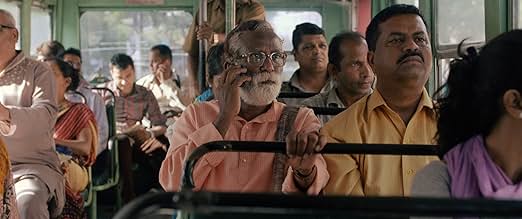
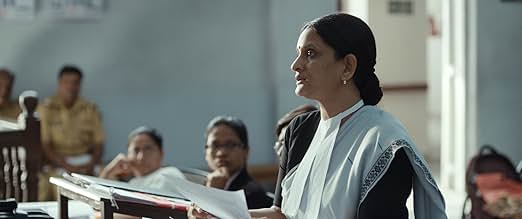
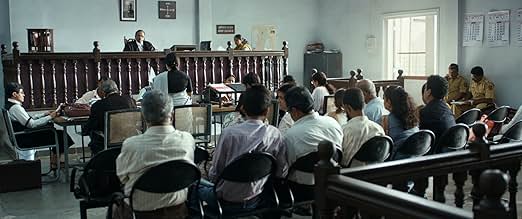
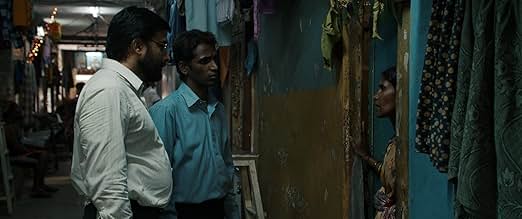
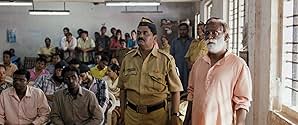













![Peepli [Live]](https://m.media-amazon.com/images/M/MV5BNDc1YTEwYmUtYTIxMC00Mjg4LWJmODctNGNiYjNjMTA3NjY5XkEyXkFqcGc@._V1_QL75_UY207_CR2)

